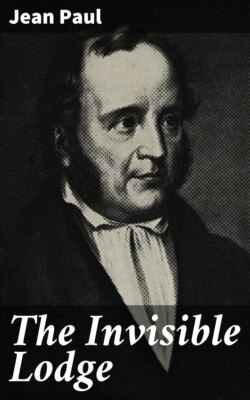Читать книгу The Invisible Lodge - Jean Paul - Страница 32
На сайте Литреса книга снята с продажи.
CONTINUATION OF THE FOREGOING SECTION.
ОглавлениеTable of Contents
While I was questioning the Abbess, my attention was drawn away from the extravagantly whimsical Captain's lady. I will suppose that I or the reader had married her; then we should certainly have thanked heaven that we had screwed our brilliant ring on her ring-finger; and yet, as one sees, we should have had every day to have a tussle with her; so true it remains, that not the vices, but the whims of women strew so much horse-dust and so many thorns in the nuptial couch, that oftentimes Satan would be glad to lie there.
But for Gustavus, who carried so much, we should not have got out of the Castle ten minutes ago. My reader pictures him to himself, quite contrary to my expectation, and very falsely, namely, as being sad, because he has quitted the earthly cradle of his childhood, his garden of Adam and his evening mountain. How false! Another reader would imagine him full of joy, because with children, to whom every change of scene presents a new one, journeying is the creation of a new heaven and a new earth, and because the fancies of a child are not as yet gloomy ones. Scheerau must have seemed to his anticipation nothing less than the city with long houses, wherein he had played with his sister. Besides--which is a naturalization-act to all children--his play-house had been put on board; even the starling, who, as an agitated hierarch, sprang up and down in the Solomon's-Chapel-of-Ease, he held in his jouncing lap. He pitied every corner of the Castle with all that was in it, that it could not take passage with him; this whole shell of a house seemed to him so narrow, so worn out, so faded out! People who have traveled little look upon their familiar home at the moment of departure, at that of arrival, and at other times, with three different feelings; but for migrating locusts and birds of passage the high roads and city streets are only the corridors between the apartments.
Half an hour before starting he seated himself on the empty coach-box, with his legs wedged in among the baggage and in palpitating expectation of the moment when the horses should make their first leap. At last the carriage door was shut to and all rolled away, down the mountain, across the common, on which the white, peeled tree that was once more to be planted in the earth with red-painted flag and ribbon streamers for the church-wake, grew quite despicable in the eyes of Gustavus, who was just going to meet in Scheerau a hundred finer May-poles and church fairs. But as he passed along by the fruitful region of his mountain, where such a harvest of joys had ripened for him: Ah, then, from the funeral pile of dead afternoons, from the tinkling herd that grazed on the summits, from an associate herd boy with whom he had been no great friends, from the stone-built pen in which he had folded his lamb, that now stood up there without a ribbon and without any one to love him, and, finally, from the boundary-stone, on which once his sweetheart, his beauty, sat knitting--from all this, of course he turned his eyes away slowly, with many a long-lingering backward glance. "Ah!" he thought, "who will give thee citron-cakes and my little lamb crusts of bread? But I will send you over every day ever so many things!"
It was a pure October morning, the mist lay folded up at the feet of the heavens, the migrating summer still hovered with its blue pinions high over the foliage and the flowers which had brought it, and gazed with its broad and quietly warming sunny eye upon man, to whom it was bidding farewell. Gustavus would fain get out of the carriage, in order to wrap up the dew-sprinkled, fleeing summer, which, delicately woven, overspread the earth like a human life, and take it along with him. But thou, man! how often dost thou hang down over nature as a pestilential and mephitic vapor!
For they could hardly have gone on a league, after which he already began to take every village for Scheerau.... But I will first indicate where it was. At Yssig he screamed out in the wood: "O now the black arm yonder will reach in and take me out!" While the old man was still wondering how the little one knew that a finger-post was coming, which now actually pointed out from among the trees, all at once in behind there a voice began to scream: "Oh! my eyes! my eyes!" The child and the mother were petrified with terror; but the Captain leaped out from or through the carriage, smashed the glasses and bounded into the wood--and right upon a beautiful kneeling child, from whose lacerated eyes ran tears and water. "Oh, don't do anything to me, I can never see any more!" he said, and groped about him with his hands, in order to strike away the lancet which lay at his knees. "Who has done this?" said the Captain, with the softest voice, that broke with intense compassion; but ere the child spoke, an old haggard beggar-woman approached and said a beggar had darted into the thicket, who would fain have blinded the child, in order to beg with it. But the child clung with increasing convulsions to his hand, and said: "Oh, she will cut me again!" The Captain guessed the knavery, broke off the nearest branch, switched at the wretched woman's face with a rage that missed its aim, and ran with the blind boy in his arms to the affrighted carriage. It was a heart-rending spectacle, the innocent worm, with fine features and movements, in rags, and with red and wrinkled eyes!
